You know, of course, why you should always choose the left leg of a roast partridge? Because that’s the leg the bird stands on when resting: it’s plumper, tastier and altogether more succulent. These things matter, and in Jean Francaix’s extraordinary 20-minute a capella showpiece Ode à la gastronomie they’re elevated to the level of a religion. “It’s very French”, Robert Hollingworth warned us before this performance by I Fagiolini at the 2016 Lichfield Festival – and he wasn’t joking. “If Eve could lead us to perdition for an apple, what would she have done for a roast turkey?” “Dessert without cheese is like a beautiful woman who has lost an eye”.
Francaix takes his text freely from Brillat-Savarin’s La Physiologie du gôut, and sets it to a droll, chattering stream of musical consciousness, complete with kitchen sounds, parodies of Chopin and Poulenc and swaggering mock-classical perorations. Hollingworth apparently discovered this almost unperformed score (it dates from 1950) in a music shop in Hereford, and I Fagiolini (pictured below) have now made the first recording. The discs were sold out by the time I got to the sales desk – suggesting that the group’s elegant and superbly nuanced live performance had whetted quite a few appetites for what Hollingworth calls this “vast Gallic giggle”.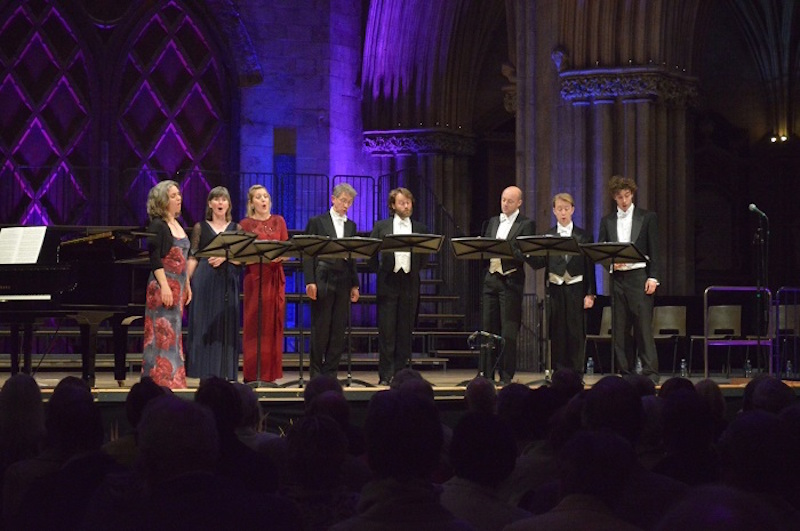 And if that wasn’t exactly what you expected to discover at the Lichfield Festival well, what are festivals for, if not the unexpected? In Sonia Stevenson’s second year as artistic director, the festival’s new direction is becoming clear. Sensibly, given the financial difficulties that preceded her arrival, Stevenson has kept the established outlines – big concerts in the Cathedral, chamber music at outlying venues in the city and surrounding countryside, and a big, lively strand of more family-oriented work. But within that framework, there’s endless scope to experiment, to play with expectations and to spring a few delightful surprises – like the Francaix.
And if that wasn’t exactly what you expected to discover at the Lichfield Festival well, what are festivals for, if not the unexpected? In Sonia Stevenson’s second year as artistic director, the festival’s new direction is becoming clear. Sensibly, given the financial difficulties that preceded her arrival, Stevenson has kept the established outlines – big concerts in the Cathedral, chamber music at outlying venues in the city and surrounding countryside, and a big, lively strand of more family-oriented work. But within that framework, there’s endless scope to experiment, to play with expectations and to spring a few delightful surprises – like the Francaix.
And Stevenson makes shrewd artistic choices. The opening concert coincided with the centenary of the first day of the Somme. But instead of reaching for the obvious Butterworth, Britten or Vaughan Williams, Stevenson teamed the Lichfield Cathedral Chorus with the Manchester Camerata, conductor Ben Gernon, and three major stars: Ailish Tynan, Stephen Gadd, and trumpeter Tine Thing Helseth (pictured below). And then devoted pretty much the entire first half of the concert over to (count ‘em) two world premieres by the festival’s 2016 composer in residence Deborah Pritchard. Pritchard’s unaccompanied anthem We Remember Them began atmospherically with whispered syllables over a low bass hum, before resolving into more conventional harmonies for a stately setting of words by Sylvan Kamens and Jack Riemer. Warmly sung by the Cathedral Chorus under its regular conductor Ben Lamb, it should go straight into the choral society repertoire. 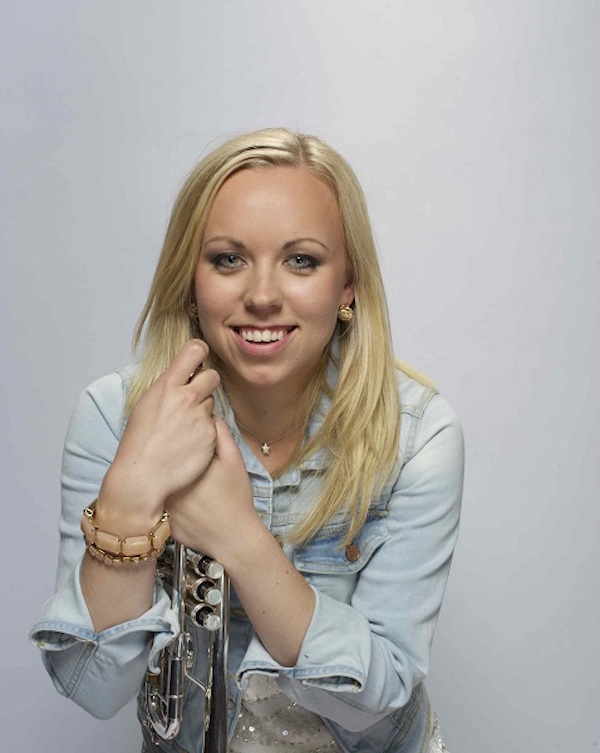 The second premiere was Seven Halts on the Somme, a concerto for trumpet, strings and harp inspired by semi-abstract paintings by Hughie O’Donoghue. Or at any rate, by their colours: Pritchard is synaesthetic, and the work’s seven short, linked episodes evoked moods rather than painted explicit pictures. Helseth’s trumpet orated over pedal notes, declaimed over whirling flurries of strings and finally ascended into stillness amidst a shimmering halo of sound, suggested by an image of a white road merging with a distant horizon. Pritchard has a wonderful ear for string sonorities, and those final bars evoked the sunlit haze that ends that other wordless war requiem, Vaughan Williams’s A Pastoral Symphony. Gernon and the Camerata accompanied deftly and transparently; only Helseth herself sounded slightly uncomfortable in some of the more low-lying passages. Barely 15 minutes in length, it was warmly received.
The second premiere was Seven Halts on the Somme, a concerto for trumpet, strings and harp inspired by semi-abstract paintings by Hughie O’Donoghue. Or at any rate, by their colours: Pritchard is synaesthetic, and the work’s seven short, linked episodes evoked moods rather than painted explicit pictures. Helseth’s trumpet orated over pedal notes, declaimed over whirling flurries of strings and finally ascended into stillness amidst a shimmering halo of sound, suggested by an image of a white road merging with a distant horizon. Pritchard has a wonderful ear for string sonorities, and those final bars evoked the sunlit haze that ends that other wordless war requiem, Vaughan Williams’s A Pastoral Symphony. Gernon and the Camerata accompanied deftly and transparently; only Helseth herself sounded slightly uncomfortable in some of the more low-lying passages. Barely 15 minutes in length, it was warmly received.
The second half of the concert comprised Brahms’s A German Requiem, in a reduced orchestration by Pritchard and John Trail. Why that was necessary is anyone’s guess: possibly a financial consideration (this same chorus has performed The Apostles and the Missa Solemnis in this venue, so space wasn’t necessarily the issue). In any case, the end result – for strings, harp, organ, timpani and a pair of horns – had the not entirely unhappy effect of making Brahms sound a little like Fauré: glowing, dusky string sounds, with harp and organ occasionally flickering up through the texture. Having Tynan and Gadd as soloists felt positively luxurious, and Gernon shaped the piece in long, eloquent lines. The Lichfield Cathedral Chorus (not to be confused with the Cathedral Choir) is a good amateur choral society with all the strengths and weaknesses that go with that (the tenor section is practically nonexistent), but Gernon drew them out of themselves: at their best, the results were luminous.
At Swinfen Hall – a Georgian pile a few miles south of the city – there was a full audience for an afternoon recital by the Heath Quartet (pictured below). On paper, this was as straight as it comes: Mozart’s Hunt Quartet, Bartók’s Third, and Beethoven’s Op.127. In reality, it was invigorating. The Heaths play standing up and the results are arresting – an unmistakable connection with the audience, and a real sense of the physicality of the performance, violinists Oliver Heath and Cerys Jones bobbing and almost dancing around each other; viola player Gary Pomeroy nodding and smiling at cellist Chris Murray on his little platform.
The Mozart was big, bright and dance-like; the Bartók so swift, subtle and coherent that it made the Beethoven that followed feel like the more dangerous proposition – a performance that constantly subverted and redirected expectations, sometimes explosive, sometimes quietly undercut with dry wit. No bad thing: and proof, too, that the Heath Quartet’s freshness doesn’t preclude real insight. The way they let their sound dissolve, glistening, into the closing section of the finale was a moment to make you hold your breath.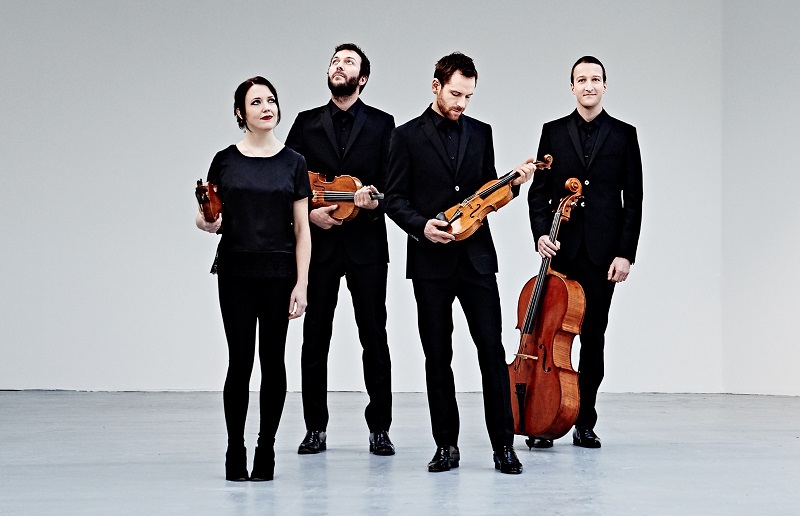 Another of Stevenson’s innovations has been semi-staged concert performances of opera in the Cathedral. Last year it was The Magic Flute, this year Così fan tutte, but the formula was the same – piano duet accompaniment, minimal staging by director Tess Gibbs (a couple of chairs and a table) and a spoken narration, delivered in character by Jonathan Gunthorpe as Don Alfonso. As with The Magic Flute, the casting was spot on. Kate Valentine (Fiordiligi), Leigh Woolf (Dorabella), Robert Murray (Ferrando) and Damian Thantrey (Guglielmo) is a line-up you’d be happy to see on stage at any regional opera company – Valentine and Woolf, in particular, made a beautifully matched pair of sisters, vocally – and they all entered into the spirit of the evening with zest.
Another of Stevenson’s innovations has been semi-staged concert performances of opera in the Cathedral. Last year it was The Magic Flute, this year Così fan tutte, but the formula was the same – piano duet accompaniment, minimal staging by director Tess Gibbs (a couple of chairs and a table) and a spoken narration, delivered in character by Jonathan Gunthorpe as Don Alfonso. As with The Magic Flute, the casting was spot on. Kate Valentine (Fiordiligi), Leigh Woolf (Dorabella), Robert Murray (Ferrando) and Damian Thantrey (Guglielmo) is a line-up you’d be happy to see on stage at any regional opera company – Valentine and Woolf, in particular, made a beautifully matched pair of sisters, vocally – and they all entered into the spirit of the evening with zest.
The problem was that to accommodate the narration, most if not all of the recitatives had been cut: something which reduced Anna Dennis’s role as a particularly knowing Despina to a fragment of its real self. A bigger problem was that in the cathedral acoustic, the attack of four hands on one piano rendered the words (it was sung in English, in an uncredited translation) almost inaudible, at least where I was sitting at the back of the Nave. I gave it until the interval before the frustration became too much. Video screens around the cathedral showed live close-ups of the singers’ faces; if the Lichfield Festival continues to present operas here (and I hope it does), perhaps these might be better used for surtitles?
Still, this is a festival, after all – a time for trying new things. Better that they should aim for the moon and land among the stars than serve up a stale parade of touring ensembles touting their back catalogue. All the signs are that, artistically at least, Lichfield has regained its mojo: I’d gladly have attended Mona Siddiqui’s talk, the Orchestra of the Swan’s programme of Charlie Chaplin silent films or the BBC National Orchestra of Wales playing another Deborah Pritchard premiere. Lichfield Festival is taking risks again, and you can feel the creative energy starting to flow. Just 90 minutes by train from London Euston, it’s somewhere to go and be surprised.

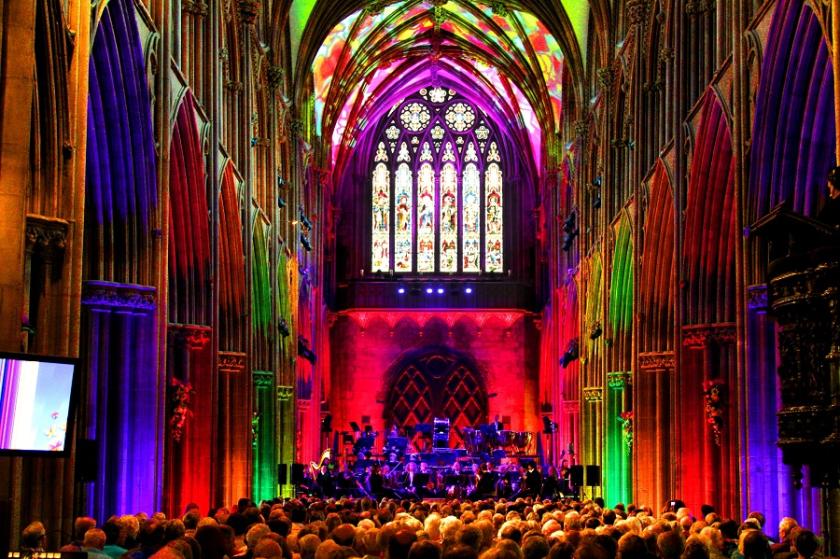


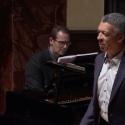
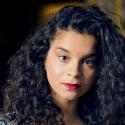

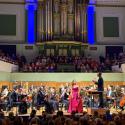
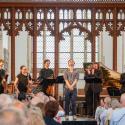
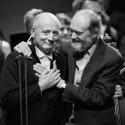
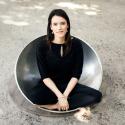


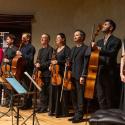
Add comment